Institutional ecosystem
Autorité de la concurrence, DGCCRF, sector-specific authorities (ART, ARCEP, ARCOM, CRE), etc. What are the respective powers of these authorities? How do they work together? Here is an overview of these administrations and regulatory authorities.
Since the 2008 reform (French law on the Modernisation of the Economy of 4 August 2008 [“LME Law”]), the main tasks involved in regulating competition (fighting anticompetitive practices, advisory activity, merger control) have been concentrated within the Autorité de la concurrence, which was also given its own investigative powers. However, the Autorité still works closely with the DGCCRF, which in particular passes on any evidence and practices that it detects through its local presence.
The Autorité also regularly works with the sector-specific authorities; the French Commercial Code (Code de Commerce) requires that they consult each other.
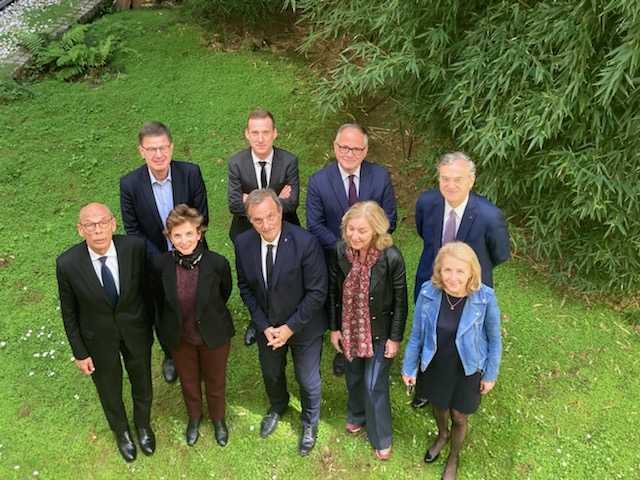
Legend (left to right):
Front row: Bernard Roman, President of the ART, Marie-Laure Denis, President of the CNIL, Jean-François Carenco, President of the CRE, Isabelle Falque-Pierrotin, President of the ANJ, Laure de la Raudière, President of ARCEP.
Second row: Benoit de Juvigny, Secretary General of the AMF, Floran Augagneur, Vice-President of the CNDP, Benoît Cœuré, President of the Autorité de la concurrence, Roch-Olivier Maistre, President of ARCOM.
Directorate General for Competition Policy, Consumer Affairs and Fraud Control (DGCCRF)
 A department within the French Ministry of the Economy, the Directorate General for Competition Policy, Consumer Affairs and Fraud Control (DGCCRF) performs numerous functions in three main areas.
A department within the French Ministry of the Economy, the Directorate General for Competition Policy, Consumer Affairs and Fraud Control (DGCCRF) performs numerous functions in three main areas.
Regulation of market competition
The DGCCRF plays an active role in fighting cartels and abuses of dominant position. Through its work on the ground, it monitors and participates in their detection. In some cases, it may provide assistance to the Autorité with dawn raids, and it also deals with local anticompetitive practices. It has jurisdiction in unfair commercial practices and restrictive competitive practices.
-
Detection
The DGCCRF’s regional coverage is essential for detecting breaches of competition law. The Autorité can rely on evidence passed on by the eight interregional competition investigation brigades (brigade interrégionale d’enquêtes de concurrence – BIEC) in metropolitan France and the overseas territories. The DGCCRF regularly sends evidence and investigation reports to the Autorité. Depending on the scope of the practices (local, national or EU), size of the companies, case interest and its workload, the Autorité either carries out investigations itself or leaves them to the DGCCRF.
Generally, the DGCCRF also monitors competition in all areas of public procurement: public procurement contracts, public service delegations, partnership agreements, etc.
- Participation in dawn raids
The Autorité can request assistance from the DGCCRF’s regional services to carry out dawn raids (unannounced inspections on company premises), especially when the companies are located outside Paris.
- Local anticompetitive practices
Since 2008, the DGCCRF has had the power to issue injunctions and reach settlements in the case of local anticompetitive practices (Article L. 464-9 of the French Commercial Code). Its action in this area is important because quickly stopping local anticompetitive practices can be a significant, concrete issue for economic stakeholders and consumers.
If the companies concerned refuse to compromise, the DGCCRF forwards the case to the Autorité, which assesses whether the facts justify a fine as part of litigation proceedings.
- Restrictive competitive practices
The law on restrictive competitive practices enables the French Minister of the Economy to act in defence of public economic policy and have practices or contractual clauses affecting the fairness of commercial relations punished by the courts.
This particular power to intervene in contractual relations between private entities ensures the maintenance of commercial relations that are as transparent and fair as possible. Its action aims to protect the proper functioning of the market but also to preserve the balance in commercial relations between suppliers and distributors, or between clients and subcontractors.
For example, in July 2019 the DGCCRF brought the retailer Leclerc before the Paris Commercial Court (Tribunal de commerce de Paris) for unfair commercial practices.
In July 2019, the Autorité de la concurrence and the DGCCRF announced the signature of a cooperation charter to enhance their cooperation.
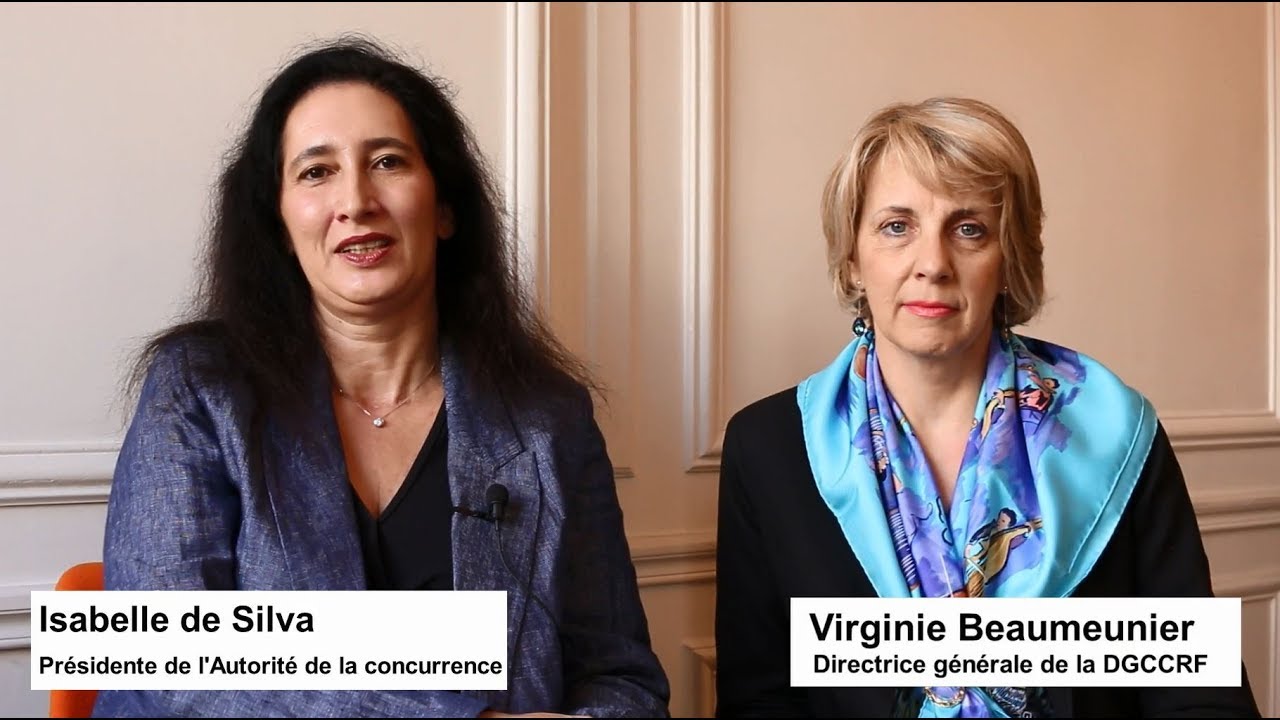
The Autorité de la concurrence and the DGCCRF strengthen their cooperation
Consumer safety
The DGCCRF ensures that industrial and food products distributed in France comply with current standards and do not pose a danger to the public.
Consumer protection
The DGCCRF works to ensure compliance on the quality and safety of products and services (rules on the labelling, composition and description of goods, etc.) and takes action over misleading advertising, sham rebates and abuse of weakness.
French electronic communication, post and print media distribution regulator (ARCEP)
The French electronic communication, post and print media distribution regulator (Autorité de régulation des communications électroniques, des postes et de la distribution de la presse – ARCEP) deals with high speed and very high speed broadband, improved mobile coverage, hertzian audiovisual broadcasting, 5G, the opening up of competition in the postal sector, the regulation of press distribution, etc.
Set up in 1997 when the telecommunications sector was opened up to competition, with the aim of helping new operators to find their place alongside the incumbent operator, the French telecommunications regulator (Autorité de régulation des télécommunications – ART) became ARCEP in 2005. ARCEP is responsible for the opening up of these sectors up to competition and for implementing ex ante tools to protect competition between the various players in the sector concerned. It has investigative and sanctioning powers.
ARCEP is responsible, among other things, for:
- the regulations applicable to telecommunications and postal operators;
- issuing sector-specific opinions to the French government, parliament or other independent administrative authorities, especially the Autorité de la concurrence;
- settling disputes between two operators on the technical and financial conditions of network access or interconnection
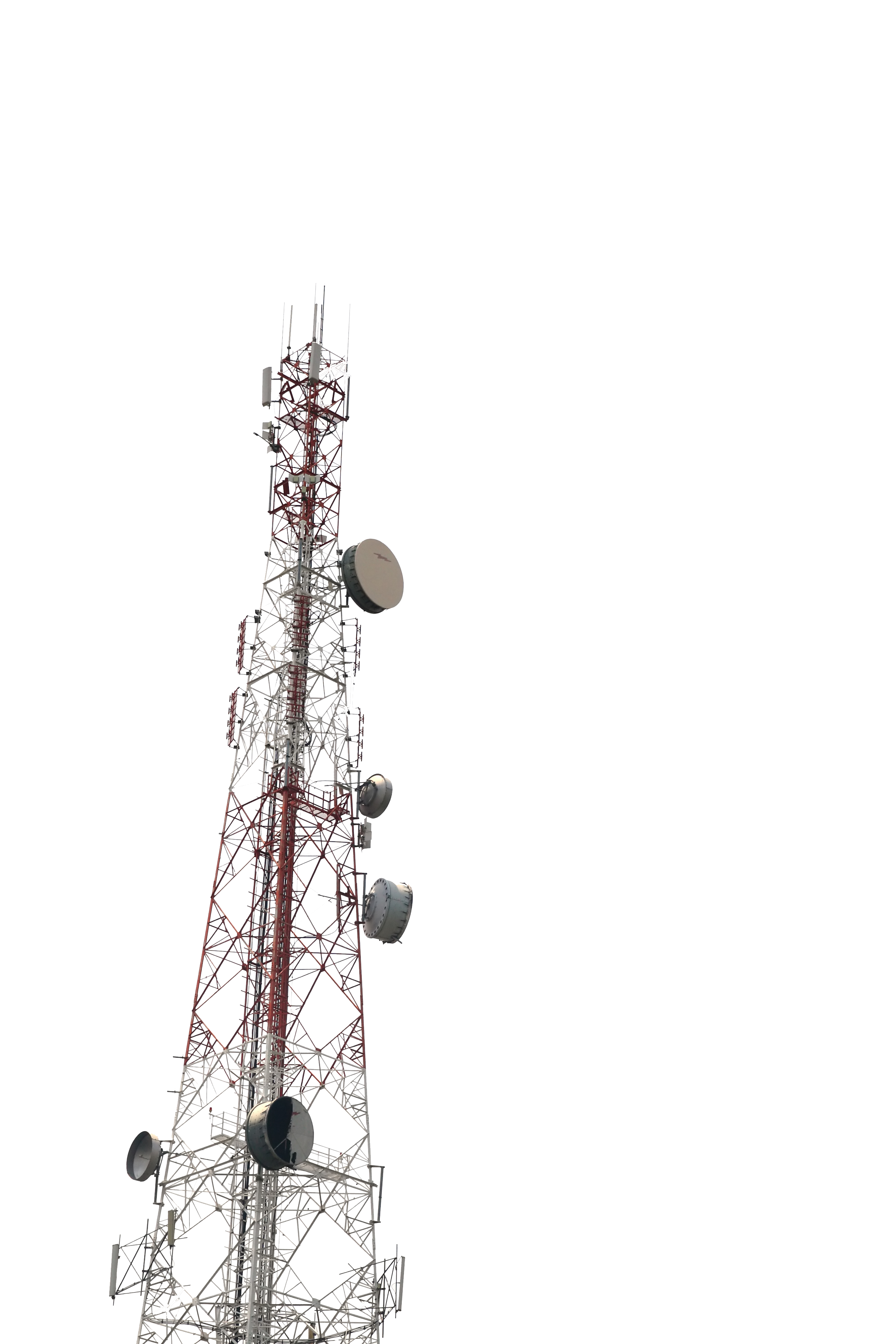
Institutional dialogue
The President of ARCEP must refer to the Autorité de la concurrence any abuses of dominant position or anticompetitive practices of with ARCEP becomes aware in the sectors within its jurisdiction. They may also refer any issue within the jurisdiction of ARCEP to the Autorité.
The Autorité de la concurrence must inform ARCEP of any referral received that falls within the jurisdiction of ARCEP and seek the opinion of ARCEP on any practices referred to the Autorité within the postal sector.
French transport regulator (ART)
The French transport regulator (Autorité de régulation des transports – ART), which replaced the French rail and road regulator (Autorité de régulation des activités ferroviaires et routières – ARAFER) in October 2019, supports the opening up of the rail sector to competition and regulates coach transport, motorways and airports.
The ART has broad powers to perform its role, such as extensive investigative and sanctioning powers, and can use those powers to, for example, temporarily prohibit access to the rail network or impose fines. In addition, disputes may be referred to the ART where a complainant believes that they are the victim of unfair treatment, discrimination or any other practice related to access to the rail network.
In the coach transport sector, the launch of any scheduled service with a distance of less than 100 km between two stops must also be notified to the ART. Coach services of more than 100 km are totally deregulated.
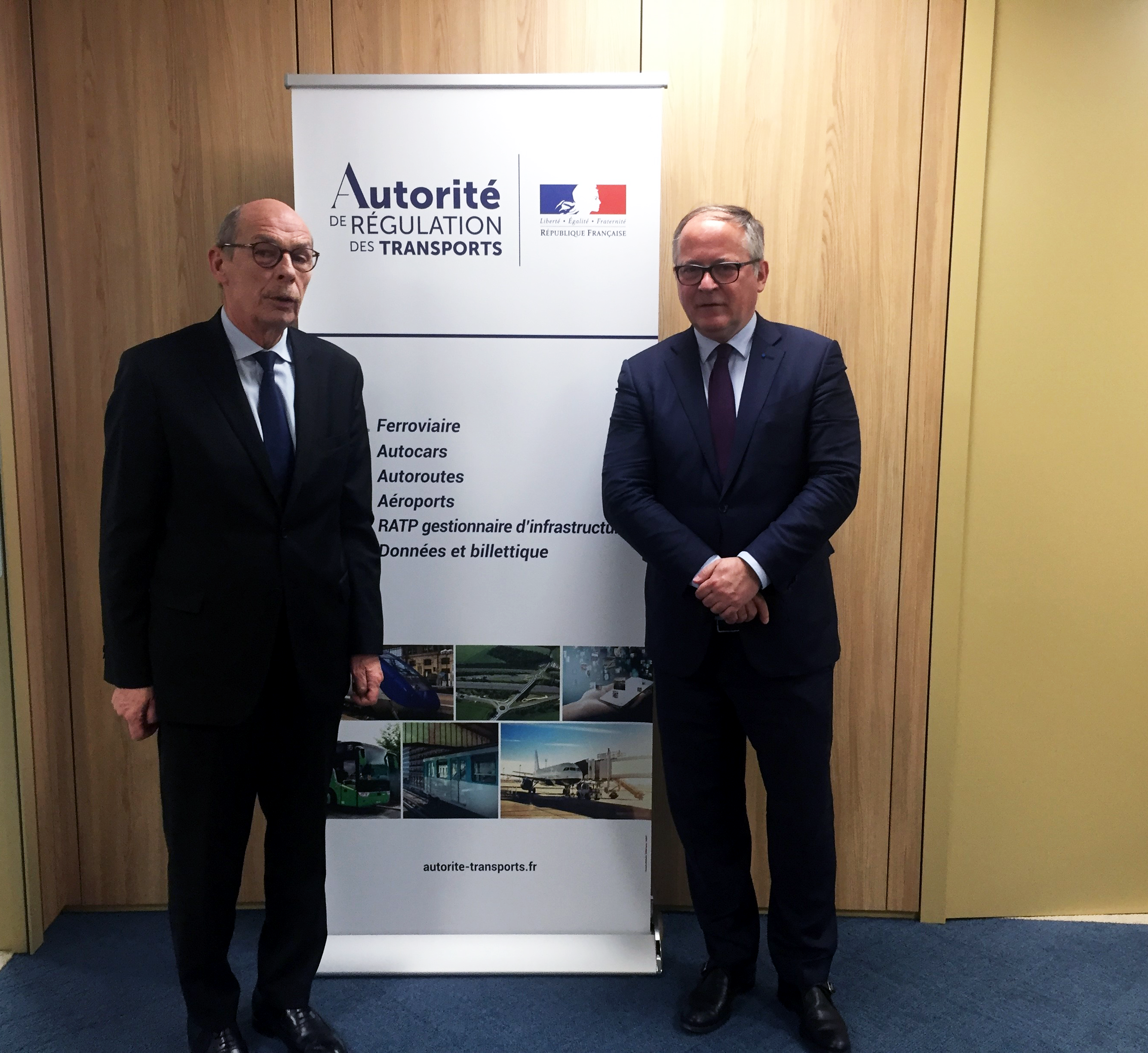
Cooperation in the rail sector
French audiovisual and digital communication regulator (ARCOM)
The French audiovisual and digital communication regulator (Autorité de régulation de la communication audiovisuelle et numérique – ARCOM) was created by the merger of the French broadcasting regulator (Conseil supérieur de l’audiovisuel – CSA) and the French high authority for the dissemination of works and the protection of rights on the internet (Haute autorité pour la diffusion des œuvres et la protection des droits sur Internet – HADOPI).
ARCOM guarantees freedom of communication and oversees the funding of audiovisual creation and the protection of rights. Its regulatory remit extends to online platforms such as social networks and search engines. It monitors changes in the audiovisual and digital landscape and acts in the interests of all, professionals and the general public alike.
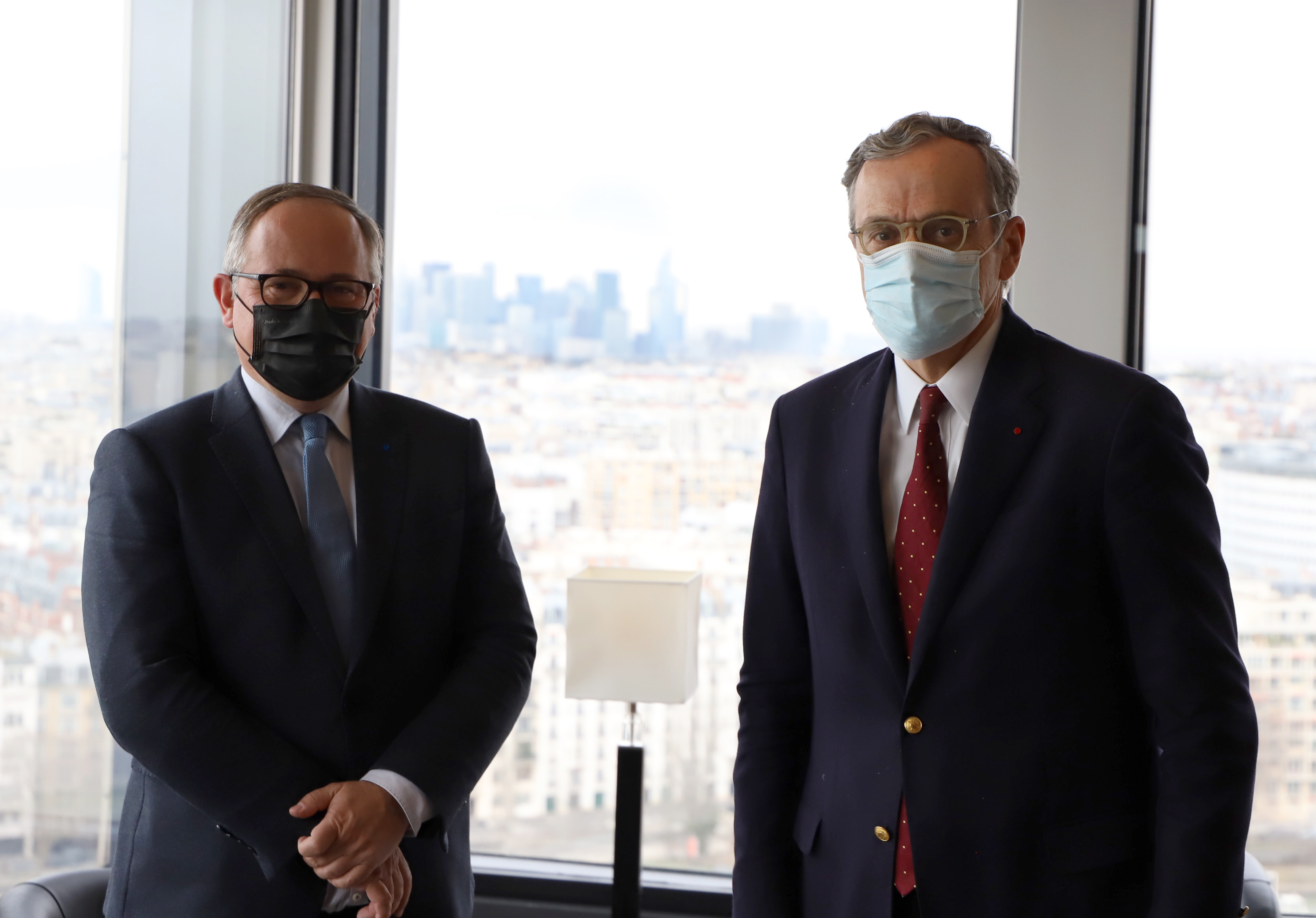
A collaborative effort
French energy regulator (CRE)
The French energy regulator (Commission de régulation de l’énergie – CRE), created when the energy markets were opened up to competition, oversees the functioning of the electricity and gas markets in France.
Its responsibilities cover two areas: regulation of the electricity and natural gas networks, to guarantee non-discriminatory access to transmission and distribution infrastructure for users, and regulation of the markets, to guarantee free and fair competition. Thus, the CRE supervises competition between energy suppliers. The regulated retail tariffs for electricity and gas are set by the French government, based on proposals made by the CRE.
The Dispute Resolution and Penalties Committee of the CRE settles disputes between operators and users over access to the public electricity and gas networks and their use. It also applies penalties for breaches of the French Energy Code (Code de l’énergie).
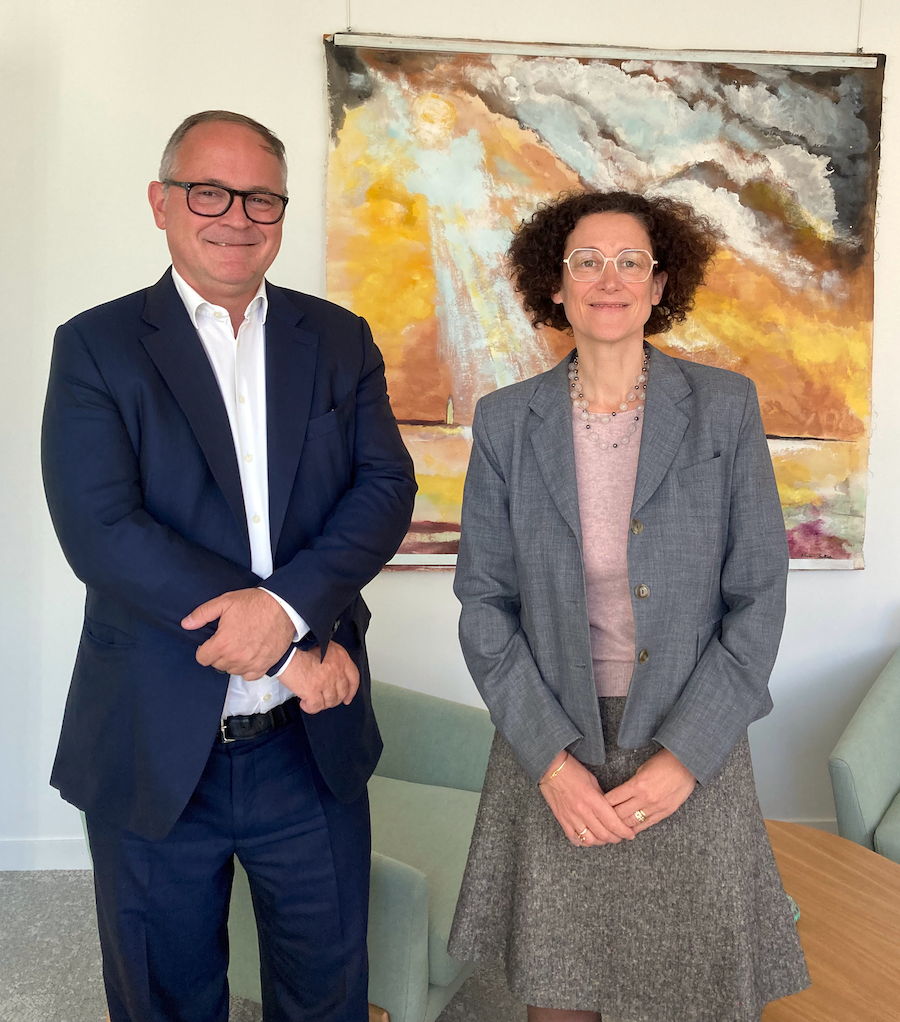
Complementary responsibilities
The President of the CRE may ask the Autorité for an opinion or report to the Autorité any anticompetitive practices in the electricity or gas sectors. The Autorité must in turn inform the CRE of any referral related to the energy sector, so that the CRE can comment.
French data protection authority (CNIL)
Created by the French Data Protection Act of 6 January 1978, the role of the French data protection authority (Commission nationale de l’informatique et des libertés – CNIL) is to safeguard citizens’ freedoms in the digital age by monitoring and controlling the use of personal data contained in paper and computer files and processing systems, both public and private.
Significant interplay
Competition law and personal data protection are powerful tools that shape our economy. In today’s world, there is ever-increasing interplay between these two regulatory areas, linked to the development of the data-driven digital economy. The Autorité can request an opinion from the CNIL, and vice versa.
The Apple ATT case (Decision 21-D-07 of 17 March 2021), in which the Autorité recognised, for the first time in its analysis, that user privacy protection could constitute a “legitimate objective”, marking a real step forward in the integration of privacy protection in competition authorities’ analysis, is a good example of the cooperation between the Autorité and the CNIL, as the investigation is still ongoing in close cooperation with the services of the CNIL.
To find out more, see the speech given by the President of the Autorité de la concurrence to the Board of the CNIL in 2022: “Competition law and personal data protection” (in French).
Print the page
